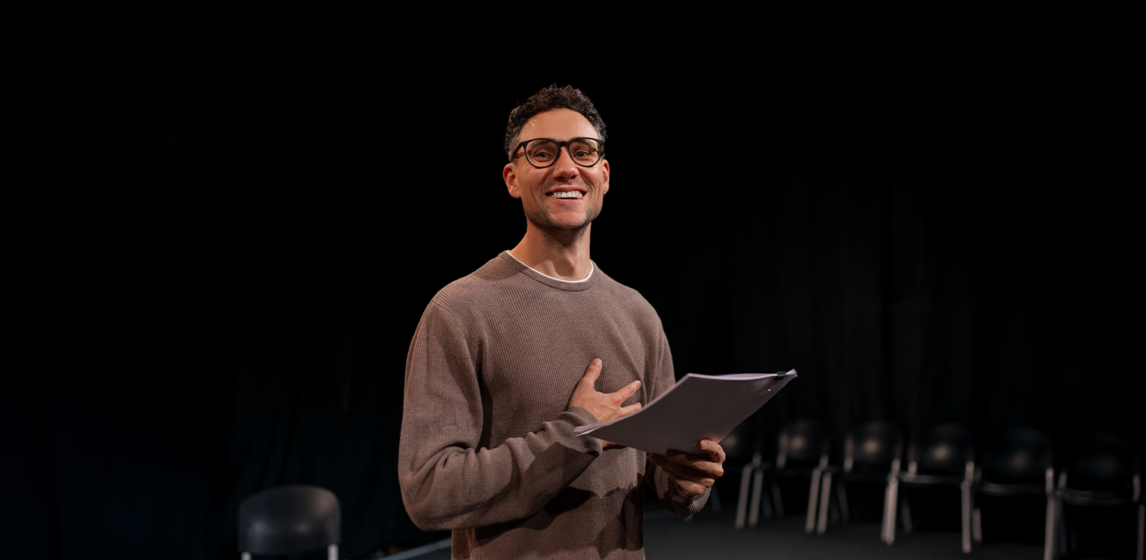Learning to listen to teenagers
 Kara Powell
Kara Powell
 Brad M. Griffin | Jul 22, 2021
Brad M. Griffin | Jul 22, 2021
Janelle is a junior in high school. She’s friendly, easy to talk with, and thoughtful. Her brother is one of her closest friends; he makes her feel good about herself. She often hangs out with his friends because they cause “less drama” than the girls she knows at school.
For a period of time when Janelle was younger, her family experienced homelessness, moving from shelter to shelter. After her mom married her stepdad, their housing stabilized. She has lived in the same apartment for a few years now and likes her neighborhood. When asked to share a photo of something that reminds her of belonging, Janelle shared a picture from her phone of her front door—because home is where she feels safe. One of her dreams for the future is not to live in an apartment. Someday she’d like to live in a yellow house, with a yard where kids can play.
Like many teenagers in her generation, Janelle wrestles with anxiety. She remembers several intense experiences with mental health struggles in middle and early high school.
I didn’t know it was anxiety at the time. I was always sick, but I would pretend I was fine, like there was nothing wrong. My therapist now says it was a coping skill. I wouldn’t let myself eat if I was anxious. I would tell my mom that I had already eaten so she wouldn’t be worried. Or I would tell her that I had friends I would hang out with, because I didn’t want her to be worried that I wasn’t making friends. I would hide in the bathroom to cry several times a day, and sometimes have panic attacks.
Eventually, Janelle was diagnosed with an anxiety disorder, and she found the help she needed.
It’s important to Janelle to talk with other people about mental health. Particularly as an African American, she thinks it’s vital to share her journey with other Black students to destigmatize getting help.
The research behind the stories
Janelle was part of a project we just completed at the Fuller Youth Institute. Our research team sat down one-on-one with twenty-seven diverse teenagers from a wide variety of backgrounds for three consecutive interviews. Each was nominated by a youth ministry leader as a young person who might be willing to talk about their life and experiences of faith. We asked dozens of questions for up to two hours at a time.
Over one hundred hours of interviews were transcribed, and our team pored over the transcripts and reports from each interviewer, and met to explore themes and share highlights. We also reached out to more teenagers through twelve focus groups to field our ideas and learn from their helpful correctives.
Alongside interviews, a literature review team explored themes of identity, belonging, purpose, faith formation, Generation Z, and narrative studies. Over one hundred cross-disciplinary academic and popular sources were consulted in this process.
Finally, we compared what we heard in these in-depth interviews with data from 2,092 youth ministry student surveys from our recent innovation project that focused on identity, belonging, and purpose.
We did all this listening so you could hear young people in their own words—and hear them better.
Listening for the 3 Big Questions in Janelle’s story
Like all teenagers, Janelle is working out her identity, belonging, and purpose while navigating the daily ups and downs of adolescence. As we spent more time with her, we were able to understand Janelle’s own unique journey in answering 3 big questions that drive much of adolescent attitudes and actions.
Identity: Who am I?
“Compassionate” is how Janelle describes herself, in part because it’s an important quality she looks for in a friend. She says her own tough experiences have given her more compassion for other people who are struggling.
Her parents see her as confident and smart. She’s self-assured, but others’ opinions also really matter. This year she started serving as a leader in her school’s Black Student Union. But painfully, Janelle is also targeted with the racial stereotype of not being “Black enough” because she gets “really good grades.” Grappling with this discrimination, Janelle asserts that other kids “shouldn’t assume Black people are not smart.”
At the same time, she feels continual pressure—internally and externally—to perform academically. “I feel like I have to do everything so perfect.” Janelle constantly lives in the intersectionality of her identity markers: young, Black, female, smart, confident, anxious.[i]
Belonging: Where do I fit?
Janelle thinks that for most people her age, friends are their safe place. But for her, it’s family and church. Her apartment’s living room is where she overall feels safest, with church being a close second. She loves her church and feels a deep sense that she is part of the community. Janelle talked about one leader in particular who has really been there for her: “She’s always checking in on me.”
Janelle thinks about belonging “all the time. I think that’s the big thing for me, but I think that’s a big thing for a lot of people. You want to know if you really fit in there, if they really like you coming along or just invited you because they felt bad.”
Purpose: What difference can I make?
Janelle gains a sense of purpose from serving at church, especially in children’s ministry. Working with kids at her church’s summer camp raised her confidence last year. She shared, “I was asked to do so many things outside my comfort zone, but that was a time when I felt happy. I was doing things for God.”
Thinking ahead to her future, Janelle offered, “I think I want to be a child development clinical psychologist. I want to work with kids.” She went on to share, “I would like to impact people the way my psychologist and therapist impacted me. They made things a lot easier for me.”
Why listening to real young people matters
One of the reasons we conducted this research was to help adults like you—and ourselves—move beyond assumptions to truly connect with teenagers.
Assumptions keep us at a distance.
Assumptions lead to judgment. We judge across generations all the time, and this judgment allows us to comfortably dismiss what we experience as different by declaring it wrong.
Young people feel this judgment. When we asked teenagers about adults’ misperceptions, we heard reactions like, “Teenagers are underestimated a lot. It’s weird when adults act like we’re less, or like we don’t know what we’re talking about. Even small comments. We notice.”
Truly listening to young people pushes us past our tendencies to assume and judge. Listening brings us closer, helping us forge a new path across the generational impasse.
Thankfully, Janelle has adults in her life who have taken time to listen well and empathize with her quest to answer the 3 big questions in light of her faith. These adults have made all the difference.
You can be that adult in the life of a teenager. In our new book, 3 Big Questions That Change Every Teenager, we’d love to share more with you about Janelle and other teenagers in our research so you can better understand the teenagers in front of you—how they talk about faith and how we might help them imagine new ways of answering the big questions.
Tweet this: Truly listening to young people pushes us past our tendencies to assume and judge. Read more about how 3 big questions can help you hear young people better.
Excerpted with permission from Kara Powell and Brad M. Griffin, 3 Big Questions That Change Every Teenager: Making the Most of Your Conversations and Connections (Grand Rapids: Baker Books, 2021).
Find out what the teenagers you care about most need most from you

Every teenager is a walking bundle of questions. You can help them find Jesus’ answers to their biggest questions of identity, belonging, and purpose with 3 Big Questions That Change Every Teenager. Order your copy today at 3BigQuestionsBook.com.
Photo by Etty Fidele
[i] By “intersectionality,” we mean the interconnected nature of social categories such as race, class, and gender that can be experienced by an individual or group. The term was originally coined by Black feminist scholar Kimberlé Williams Crenshaw, cofounder of the African American Policy Forum, and has come to be used widely across many disciplines, including practical theology.
More From Us



Sign up for our email today and choose from one of our popular free downloads sent straight to your inbox. Plus, you’ll be the first to know about our sales, offers, and new releases.




